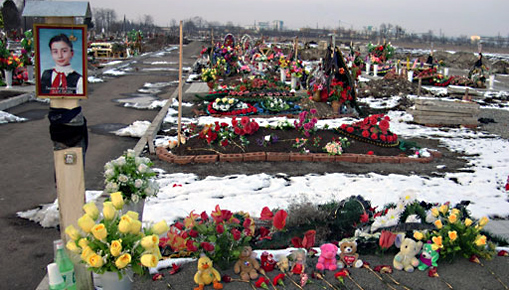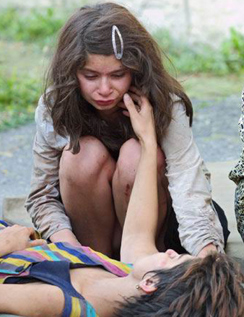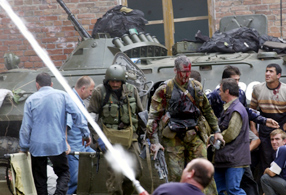by David Remnick
Reprinted from the September 2004 issue of THE NEW YORKER
In Russia, the tragic sense is not limited to Chekhovian intellectuals or tyranny’s victims. Even the privileged few, insulated by high office and a pride of bodyguards, know the truth when they care to look out a Kremlin window. In the post-Soviet period, Russian fatalism was captured best by a former prime minister and natural-gas magnate, Viktor Chernomyrdin, when he remarked, after yet another disaster of state, “We wanted it to go better, but it turned out as always.”
The hope that the collapse of Communism would lead to the evolution of a liberal, democratic order in the East remains a working proposition in Poland, the Czech Republic, and elsewhere in the region. But in Russia it has, in many respects, turned out as always. Some of the crises were predictable from the outset of the post-Communist era. It will take many years for the national economy to recover from seven decades of Communism, not to mention centuries of feudal autocracy; it may take another generation for the national psyche to heal. But only those with the most well-honed tragic sense could have imagined that in 2004 Russia would be ruled by a President whose language and instincts were shaped by his career as an officer of the K.G.B., and that the country’s most urgent threat would come from ruthless Chechen terrorists who increasingly modelled their tactics and ideology on the jihadists of the Middle East and South Asia.
The slaughter in the town of Beslan earlier this month [September 3, 2004] of hundreds of schoolchildren and their parents was a crime for which there is no defense. The act of shooting children in the back as they try to flee is no more comprehensible than the act of steering commercial airliners into office buildings. As many Russians acknowledge, however, there is a past, an original sin, behind the new crisis.
Among the results of the fall of Communism was the dissolution of the “internal empire,” the fifteen republics of the old Soviet Union. And because Russia itself was made up of eighty-nine regions, some with a complicated history, Russia’s borders, too, came into question. In the euphoria of the period, President Boris Yeltsin encouraged the various regions to assume as much sovereignty “as you can swallow.” After decades of Soviet centralism, he was thinking of a reform of degrees. But Chechnya, which had bridled under Moscow’s rule since the nineteenth century and suffered mass deportations and killings under Stalin, declared outright independence.
In Russia, the tragic sense is not limited to Chekhovian intellectuals or tyranny’s victims. Even the privileged few, insulated by high office and a pride of bodyguards, know the truth when they care to look out a Kremlin window. In the post-Soviet period, Russian fatalism was captured best by a former prime minister and natural-gas magnate, Viktor Chernomyrdin, when he remarked, after yet another disaster of state, “We wanted it to go better, but it turned out as always.
The hope that the collapse of Communism would lead to the evolution of a liberal, democratic order in the East remains a working proposition in Poland, the Czech Republic, and elsewhere in the region. But in Russia it has, in many respects, turned out as always. Some of the crises were predictable from the outset of the post-Communist era. It will take many years for the national economy to recover from seven decades of Communism, not to mention centuries of feudal autocracy; it may take another generation for the national psyche to heal. But only those with the most well-honed tragic sense could have imagined that in 2004 Russia would be ruled by a President whose language and instincts were shaped by his career as an officer of the K.G.B., and that the country’s most urgent threat would come from ruthless Chechen terrorists who increasingly modelled their tactics and ideology on the jihadists of the Middle East and South Asia.
In 1994, Yeltsin invaded, encouraged by a circle of advisers who promised a “small and victorious war.” It was neither. The Russians shelled Grozny. They rampaged through villages with tanks intended to make war on nato. More than eighty thousand Chechens, almost all of them civilians, died. Tens of thousands were left homeless or fled to other parts of Russia. Grozny was reduced to rubble, and the republic to a state of lawless ruin much like Afghanistan after its war with the Soviet Union.
And out of a terrible war came terror. Shamil Basayev, the Chechen commander who likely ordered all the massacres of the past month [September 20, 2004 — October 20, 2004]—the murders in Beslan, the bombing of two airliners in flight, the bombing outside a Moscow subway station—came to Moscow as a young man, studied land management, and tried to sell computers for a living. In August, 1991, he was among the thousands of volunteers who helped defend the Russian White House, and Yeltsin, against the coup plotters. Then he returned to Chechnya, where he joined the military wing of the independence movement. In 1995, with Grozny destroyed, Basayev and around a hundred of his men took more than a thousand hostages, including women and children, in the town of Budyonnovsk—an event that augured the rise of a new kind of insurgency.
Chechnya today is as close to a Hobbesian state as exists on earth. Grozny is a moonscape of gas fires, open sewers, and bombed-out buildings. There is almost no legitimate economy: at least seventy-five percent of the Chechen workforce is unemployed. Criminal gangs dominate the social order. Politicians are assassinated; journalists and aid workers are abducted, even executed. The Russian Army troops who remain are corrupt, lawless, given to raping, kidnapping, and executing civilians. Whatever funds Moscow sends for rebuilding invariably end up stolen.
In recent years, especially since September 11, 2001, Putin has tried hard to paint Basayev as the equivalent of Osama bin Laden, and his men as linked closely with Al Qaeda. This is a complicated equation. Reports of Chechen rebels training with Al Qaeda in Afghanistan remain murky. There is no doubt, however, that Basayev and his followers in Chechnya have been deeply influenced by the tactics, ideology, and language of jihadists abroad. Basayev, who has a bushy beard and a clean-shaven pate, dispatches video and audio manifestos, affecting a bin Laden-like image as a holy warrior. He has taken on field commanders and advisers from Saudi Arabia. And he has cultivated a group of so-called “black widows,” women willing to sacrifice themselves as hostage-takers, assassins, and suicide bombers.
Last week, in the wake of the massacre in Beslan, Putin gathered a group of Western reporters and scholars at his house outside Moscow and repudiated the idea of a negotiated settlement with the likes of Basayev. “Why don’t you meet Osama bin Laden, invite him to Brussels or to the White House, engage in talks, ask him what he wants, and give it to him so he leaves you in peace?” he said. “You find it possible to set some limits on your dealings with these bastards, so why should we talk to people who are child-killers?”
Putin is an increasingly autocratic leader. He has neutered state-controlled television, compromised the rise of an independent judiciary, and impeded independent political movements and parties. L’état, c’est Putin. And yet he has no choice but to go after Basayev. The demands of the Chechen jihadists now extend beyond Chechen independence. As Basayev made plain with his incursion into the neighboring republic of Dagestan five years ago, he is interested in pure vengeance and in extending his reach throughout the northern Caucasus.
In the longer term, finding real negotiating partners will be harder than finding Basayev. “The Russian leadership constantly reiterates that it is fighting not Chechen separatists but international terrorists, and this has finally become a self-fulfilling prophecy,” Andrei Piontkovsky, one of the leading political analysts in Moscow, has written. “Thanks to the methods with which we have waged this war, we have turned practically the whole population of Chechnya into enemies.”
The note Putin struck most distinctly at the meeting with reporters and scholars was one of paranoia, fear that outside forces—the enemies he knew as a K.G.B. officer—were somehow undermining him. Those who mean to “tear off a big chunk of our country,” he said, are being backed by those who “think that Russia, as one of the greatest nuclear powers of the world, is still a threat, and this threat has to be eliminated.”
And so the Russian people, who live in dread of further violence, find themselves at the mercy of well-trained terrorists in the south and a paranoid President in the Kremlin who refuses the burdens of democratic accountability and the need to reshape a policy that is good for little but more bloodshed. It requires no tragic sense to suppose that things are likely to turn out as always before they turn out otherwise.
David Remnick was the Moscow correspondent for THE WASHINGTON POST in the late ’80s during the collapse of the Soviet Union. He won a Pulitzer Prize in 1994 for his book LENIN’S TOMB, and has been editor of THE NEW YORKER magazine since 1998



